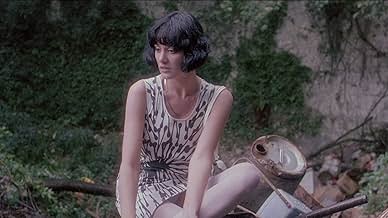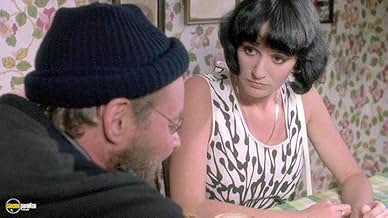Füge eine Handlung in deiner Sprache hinzuIn 1966, a woman has an enigmatic interaction with a stationmaster and his aide, setting off an intriguing chain of events that unfolds throughout the narrative.In 1966, a woman has an enigmatic interaction with a stationmaster and his aide, setting off an intriguing chain of events that unfolds throughout the narrative.In 1966, a woman has an enigmatic interaction with a stationmaster and his aide, setting off an intriguing chain of events that unfolds throughout the narrative.
Alexander John
- Radio News Reader
- (Synchronisation)
Rik Mayall
- Policeman
- (Nicht genannt)
Jeremy Watt
- Bowler
- (Nicht genannt)
Empfohlene Bewertungen
If you can track this down it's worth a watch. A young couple take a trip to the country for a cricket match he's playing in. She goes off exploring during the match and meets a peculiar character who invites her in for a cup of tea. Lesson learned - always be suspicious of a man who collects gnomes. It's quite well made. The acting is okay. Plenty of laughs - some intentional and some not - and the scene in which the murder victim is buried in a huge pile of rotting apples is really striking. There's another scene in which a body is discovered in a shallow grave with just the bum sticking out of the ground which is hilarious.
Invited to a cricket match in Kent a young woman called Pauline Cox (Tracy Hyde) gets bored with the cricket (as you do) and wanders off through an apple orchard where she encounters a garden gnome collecting railway gatekeeper (Bill Wallis) and a disturbed handyman called Ewen (Clive Mantle). A 1981 film featurette set in Kent in 1966 ,and written and directed by the unprolific Christian Marnham ,it's an example of an English psycho horror film (when they were very popular in cinemas) ,apparently loosely based on a real murder in Kent. Despite this the film (well photographed by Peter Jessop) has a distinct comic edge to it ,and linked to this a symbolic element - forbidden fruit in the orchard ,rape and murder among a mountain of apples ,and all taking place in the 'Garden of England'. And it doesn't stop there ,as we have psycho news coming over the radio from the U. S. A. ,South Africa ,and now Kent (with a psycho and a stockbroker both on the loose). All this - and sexual violence against a character made to look and sound like a glamour model - contrasts wildly with the attractive locations (one ironically named Petham) ,and give this film the slight feeling of a nightmarish satirical fairy tale.
On Thursday 15th July 1982, I was at the Turnpike Lane ABC cinema (sadly since demolished) in North London to watch 'Dead and Buried' with its supporting short 'The Orchard End Murder' and today, exactly 39 years later (to both the date and day of the week) here I am writing a review of the latter of these two films, using technology that did not exist in 1982.
I can remember next to nothing of 'Dead and Buried' but 'The Orchard End Murder' has stuck in my mind for all these years, perhaps because of its British setting. Having missed the very occasional TV screening (which tended to be in the small hours) I was delighted to find out recently that the BFI have deemed the film worthy of restoration and preservation, no mean feat for a film lasting barely 50 minutes. Consequently, I purchased the DVD from them and viewed it last week for the first time in almost 39 years.
There are many bits I remember from 1982 - the killing of the rabbit (which turned out to be more convincing than I thought I had remembered) the murder itself (although I thought it had taken place on grass rather than a huge pile of apples) and in particular, the last two scenes of the film.
The film starts off well with a lot of good tension up to the appearance of Ewen, who at that point appears to be a good guy with a pet rabbit while the stationmaster appears to be creepy at best and a potential murderer at worst.
The sudden and unexpected killing of the rabbit is perhaps too realistic looking and if the director was trying to make a point in linking violence against animals with violence against humans, he still went perhaps a bit too far in this respect.
The murder itself, and the attempted rape that precedes it, is graphic and shocking, and more notably so for the fact that it involves a strangling rather than the more common shootings or stabbings usually seen in films. We are then later treated to an unusual display of necrophilia by the murderer as he attempts to hold on to the dead body with which he has fallen deeply in love with. It is a touching performance by Clive Mantle, but the film's somewhat misogynistic attitude would not sit well today. In fact, the film would probably not even get made in today's 'woke' society.
The film ends a little abruptly, but all the same it is a beautifully photographed film though that evokes a nostalgia for an England of steam trains and village cricket matches, which makes it worth watching.
I can remember next to nothing of 'Dead and Buried' but 'The Orchard End Murder' has stuck in my mind for all these years, perhaps because of its British setting. Having missed the very occasional TV screening (which tended to be in the small hours) I was delighted to find out recently that the BFI have deemed the film worthy of restoration and preservation, no mean feat for a film lasting barely 50 minutes. Consequently, I purchased the DVD from them and viewed it last week for the first time in almost 39 years.
There are many bits I remember from 1982 - the killing of the rabbit (which turned out to be more convincing than I thought I had remembered) the murder itself (although I thought it had taken place on grass rather than a huge pile of apples) and in particular, the last two scenes of the film.
The film starts off well with a lot of good tension up to the appearance of Ewen, who at that point appears to be a good guy with a pet rabbit while the stationmaster appears to be creepy at best and a potential murderer at worst.
The sudden and unexpected killing of the rabbit is perhaps too realistic looking and if the director was trying to make a point in linking violence against animals with violence against humans, he still went perhaps a bit too far in this respect.
The murder itself, and the attempted rape that precedes it, is graphic and shocking, and more notably so for the fact that it involves a strangling rather than the more common shootings or stabbings usually seen in films. We are then later treated to an unusual display of necrophilia by the murderer as he attempts to hold on to the dead body with which he has fallen deeply in love with. It is a touching performance by Clive Mantle, but the film's somewhat misogynistic attitude would not sit well today. In fact, the film would probably not even get made in today's 'woke' society.
The film ends a little abruptly, but all the same it is a beautifully photographed film though that evokes a nostalgia for an England of steam trains and village cricket matches, which makes it worth watching.
It's a number of years since I saw this film. It was aired one day by the BBC, in the early hours, as filling between two equally dreadful chat programs.
Think of Macbeth made by Ed Wood, a la Plan 9 from Outer Space, and you'll get the picture. It packs a lot in, what with the carefully-posed nude body of the murder victim being carried through the woods to the hut, some dreadful but unintentionally funny dialogue and stumbling acting and photography. For bad film buffs there is much to enjoy.
If you can get hold of a VHS copy of this, please burn it, unless your love of the macabre is matched by your love of poor film.
Think of Macbeth made by Ed Wood, a la Plan 9 from Outer Space, and you'll get the picture. It packs a lot in, what with the carefully-posed nude body of the murder victim being carried through the woods to the hut, some dreadful but unintentionally funny dialogue and stumbling acting and photography. For bad film buffs there is much to enjoy.
If you can get hold of a VHS copy of this, please burn it, unless your love of the macabre is matched by your love of poor film.
Wusstest du schon
- WissenswertesReleased in the UK as the support short to Tot & begraben (1981), initially in fifty screens in the ABC network in the North-East of England, later in the rest of the country.
- PatzerPolice are seen searching for the missing woman at night-time. Police searches are only ever carried out during daylight hours, as this obviously increases the chances of being able to find evidence.
Top-Auswahl
Melde dich zum Bewerten an und greife auf die Watchlist für personalisierte Empfehlungen zu.
Details
Zu dieser Seite beitragen
Bearbeitung vorschlagen oder fehlenden Inhalt hinzufügen

Oberste Lücke
By what name was The Orchard End Murder (1981) officially released in Canada in English?
Antwort




















